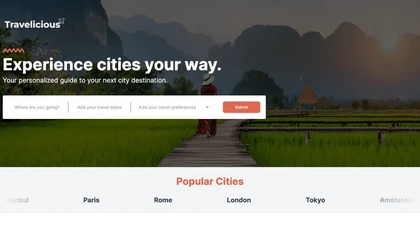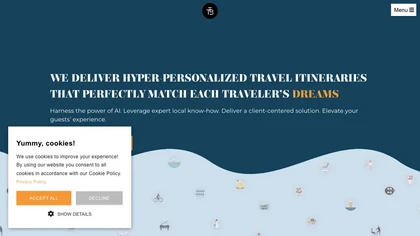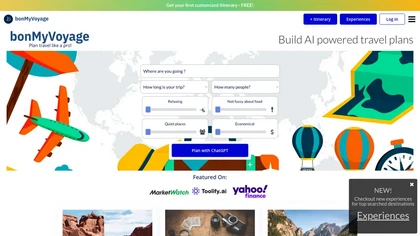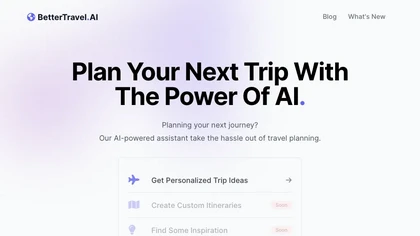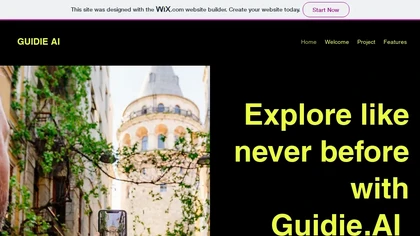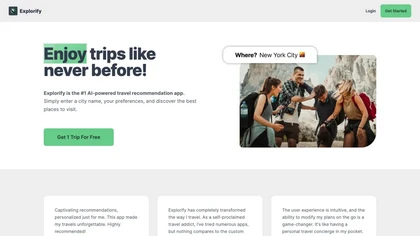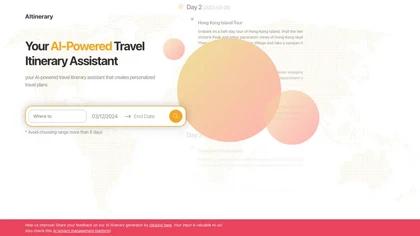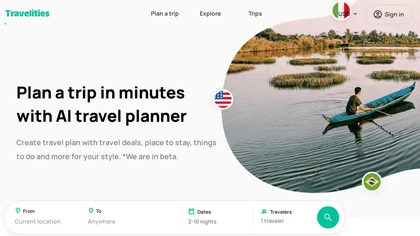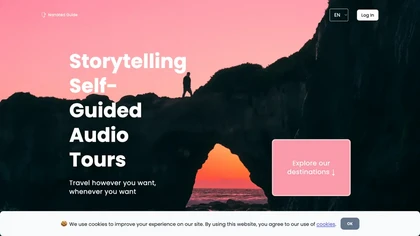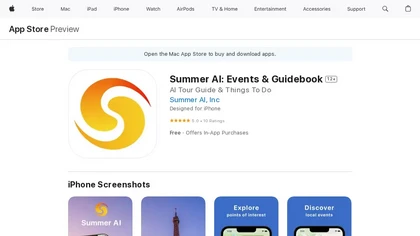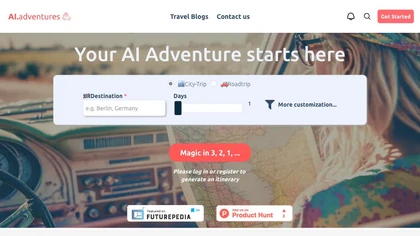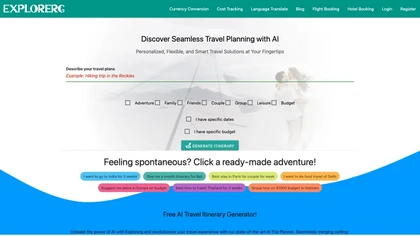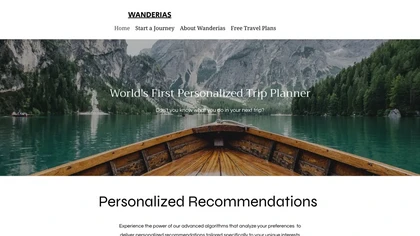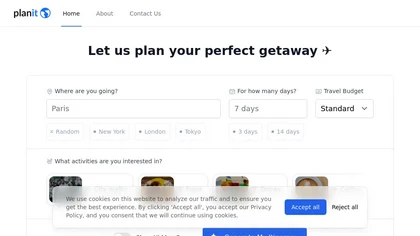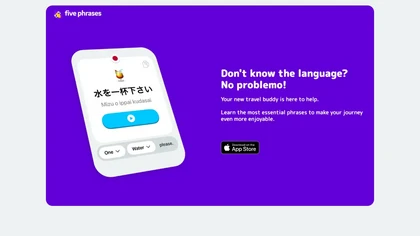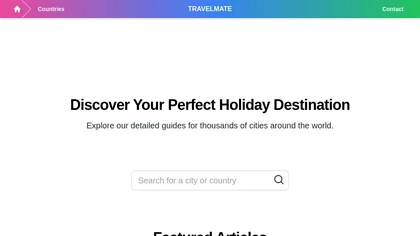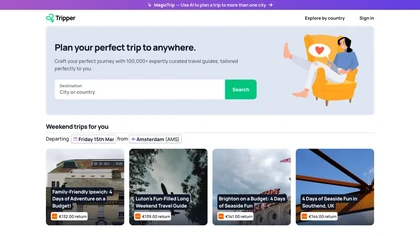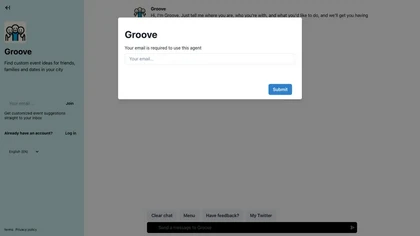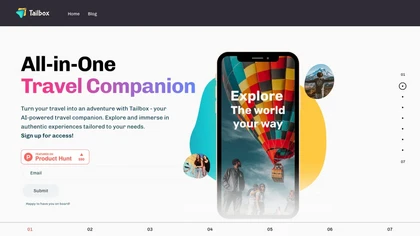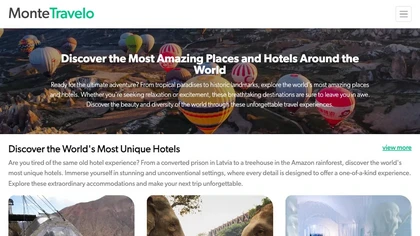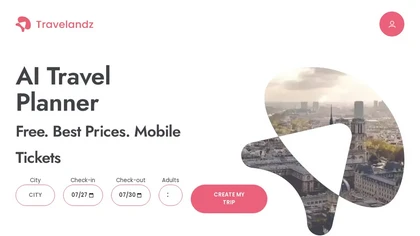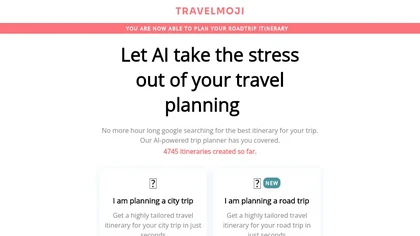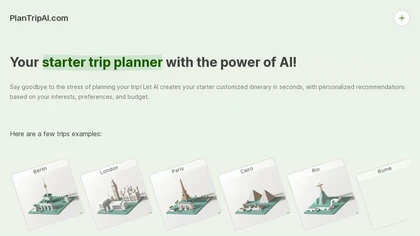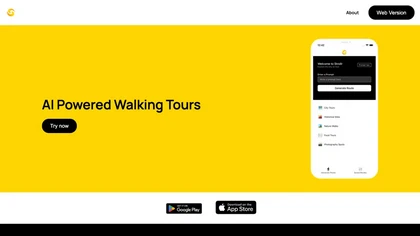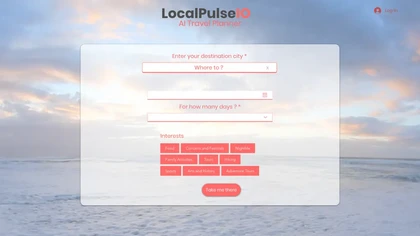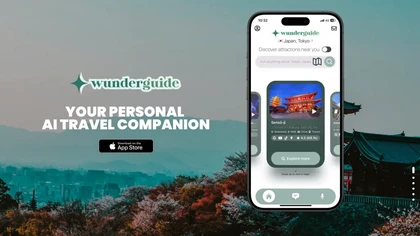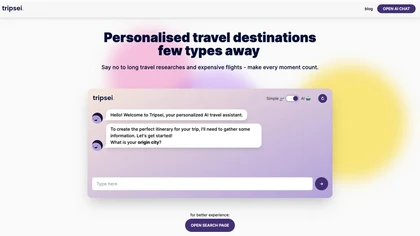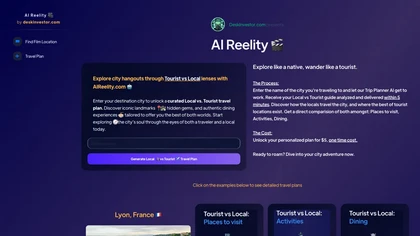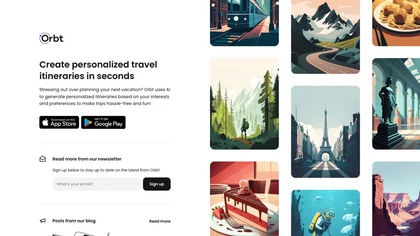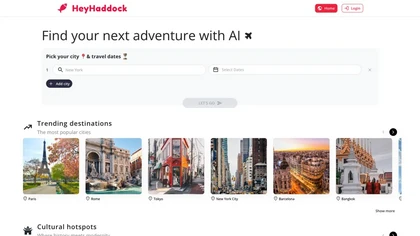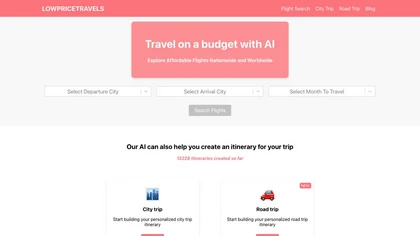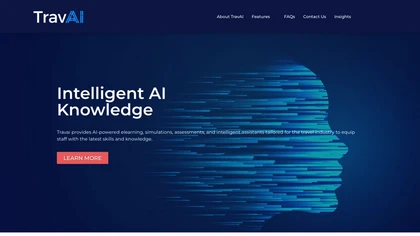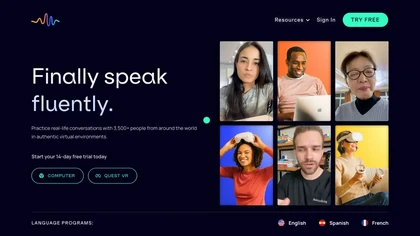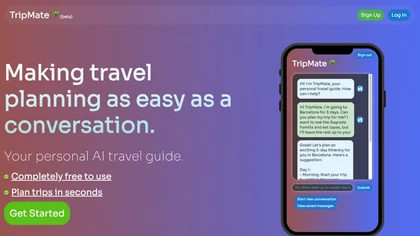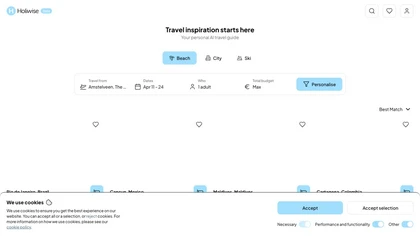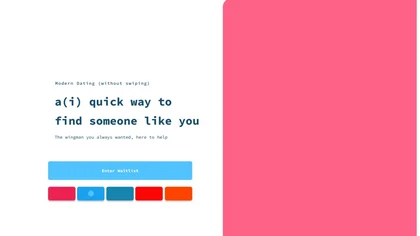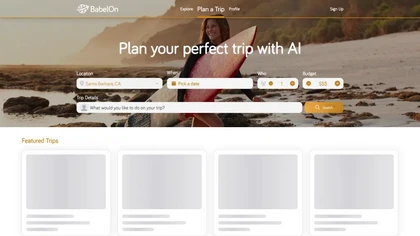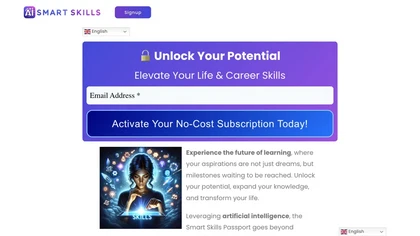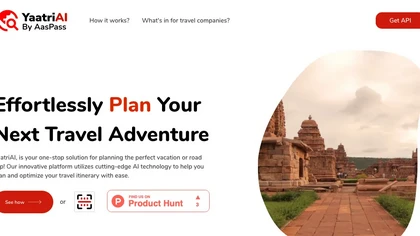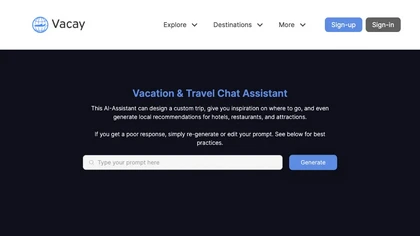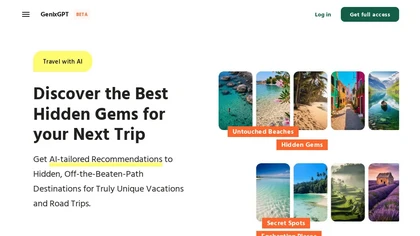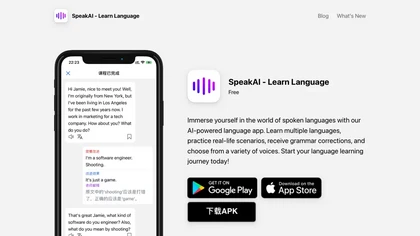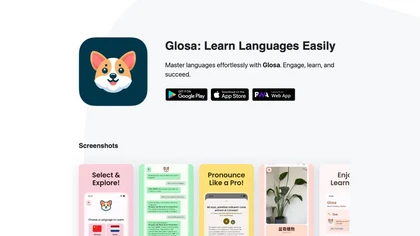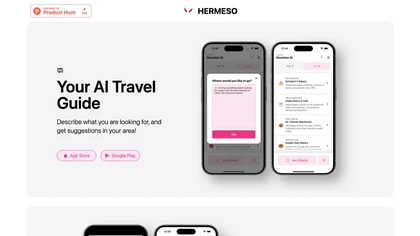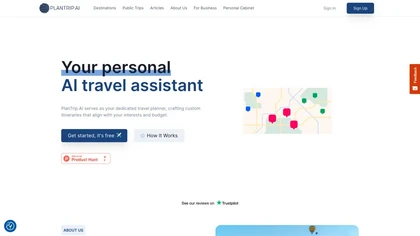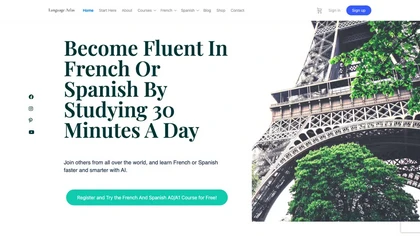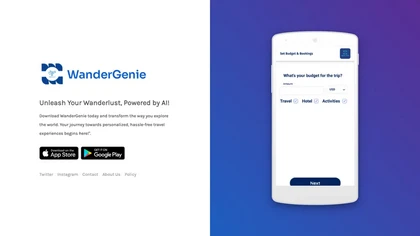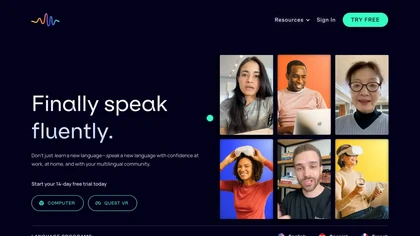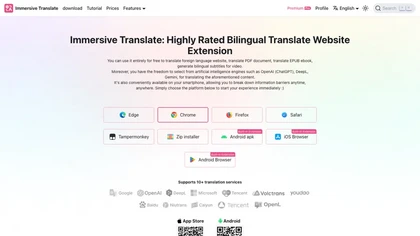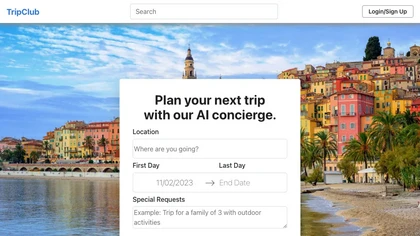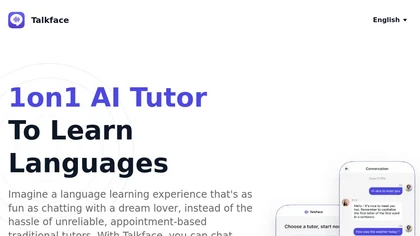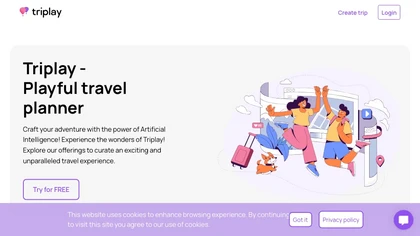AI use cases for Cultural experiences
Generative AI can be applied in various applications for cultural experiences. Here are some examples to explore below for inspiration with AI tools to get you started with using AI in cultural experiences.
🛠️ 70 AI tools for Cultural experiences
Explore a dynamic list of some of the most popular tools to get you started with various AI use cases and applications for Cultural experiences to streamline your workflows and productivity today.
Local Buddy features
- AI-powered travel planner
- Provides personalized recommendations
- Offers unique places to eat, landmarks to explore, and immersive activities
- Integrates with Google Maps for step-by-step directions
- Available on Android and iOS
Travelicious features
- Personalization of city destination experience
- Integration of AI for itinerary creation
- Recommendations based on user preferences
- Input destination, dates, budget, and interests for tailored journey
- City guide with recommendations on places to visit, eat, and explore
Travel Echo features
- Language translation
- Phrase learning
- Destination selection
- Primary language setting
- Cultural insight
The Trip Boutique features
- Create itineraries
- Recommend destinations
- Leverage expert knowledge
- Curate database of places, activities and services
- Offer various integration options
bonMyVoyage features
- AI-powered itinerary travel planner marketplace
- Customized travel plans creation
- Curated recommendations from verified users
- Tailored travel plans based on preferences
- Connect with verified locals for insider tips
Bettertravel features
- Generate personalized travel recommendations
- Customize itineraries based on user preferences and interests
- Assist with travel planning without extensive research
- Easily input budget and travel plans
- Provide tailored recommendations for a more enjoyable trip
Guidie AI features
- personalized recommendations
- plan and optimize itinerary
- real-time updates
- mobile app
- location discovery
🔥
Create your account, save tools & get personal recommendations
Receive a weekly digest of our handpicked top tools.
Unsubscribe anytime
Explorify features
- AI-powered
- Travel recommendation
- Personalized trip experience
- Curated recommendations
- Modify plans on the go
AItinerary features
- AI-powered
- Creates personalized travel plans
- Meticulously plans each day
- Suggests activities and must-visit spots
- Provides suggestions for various experiences
FreePlanTour features
- Travel itinerary generation
- Personalized travel guides
- Multi-language support
- User-friendly interface
- Subscription plans
Travelities features
- Trip planning
- Personalized recommendations
- Travel deals
- Place recommendations
- Things to do
Narrated Guide features
- Self-guided audio tours
- Immersive storytelling experience
- Support for various types of tours (walking, cycling, driving, boat)
- Personalized tour guide
- On-demand access to destination history and culture
Summer AI features
- Ai gps technology
- Personalized experience
- Walking and driving navigation
- Augmented reality discoveries
- Visually enhanced journey
AI adventures
1.8AI adventures features
- Generate personalized travel plans
- Offer options for city trips, road trips, and custom itineraries
- Use openai's gpt4 model
- Interactive travel blogs
Explorerg - Discover features
- Personalized itineraries
- Custom-made recommendations
- Currency conversion
- Language translation
- Cost tracking
Wanderias features
- AI-based personalized trip planning
- Utilizes advanced algorithms to analyze preferences
- Delivers tailored travel recommendations
- Efficiently completes vacation planning process in minutes
- User-friendly interface for creating and sharing personalized travel plans
Planit Earth features
- Generate personalized itineraries
- Cater to traveler's interests and budget
- Provide detailed itineraries
- Easily accessible through a link or pdf
Five Phrases features
- Language learning support
- Essential phrase teaching
- Audio output feature
- Native text options
- Localization support
Travel Mate features
- Select a country
- Discover perfect holiday destinations
- View ai-generated guides
- Thousands of cities worldwide
My Travel Brain
1.6My Travel Brain features
- Plan travel
- Knowledge of travel destinations
- Answer questions about travel destinations
Tripper Guide features
- Personalized travel guide generation
- Customization of trip details
- Access to over 100,000 expertly curated travel guides
- Budget-friendly options
- Exploration of off-the-beaten-path adventures
Groove features
- Custom event ideas discovery
- Personalized event suggestions
- Location-specific event recommendations
- Email delivery of event suggestions
- Preference-tailored outing planning
TravelAroundTheWorld features
- Create photorealistic ai character
- Take photos at famous spots around the world
- Variety of photo shoot styles
- Advanced ai technology and deep learning algorithms
- User-friendly interface
Travelnaut features
- Destination planning
- Trip itineraries
- Sightseeing guides
- Nightlife guides
- Insider tips
Lejrr features
- Discover new travel destinations
- Provides insights and suggestions
- Chat with AI for travel ideas
- Connect with fellow travelers and locals
- Easy reimbursement for expenses
Tailbox features
- Interactive maps
- Personalized experiences
- AI concierge services
- Curated recommendations for dining, sightseeing, and activities
- Travel community for connecting with other travelers
MonteTravelo features
- Discover unique travel destinations
- Provide unusual accommodations
- Offer access to unique spas
- Guide thrill-seekers to adrenaline attractions
- Filter choices by continent
Wonderplan features
- Personalized itinerary generation
- Customizable itinerary planning
- Real-time collaboration
- Trip feedback improvement
- Connecting with like-minded travelers
Itair features
- Personalized itinerary generation
- Customized recommendations
- Instant itinerary creation
- Support for various interests and preferences
- Solo and group travel planning support
TripTrio features
- AI-powered travel planner
- Generates customized trip itineraries
- Personalizes itinerary based on user inputs
- Suggests recommended places to visit, activities, dining options
- Allows fine-tuning of itinerary and offline access
TraveLandz features
- Personalized travel plans
- Real-time availability of hotels, attractions, and transportation
- Simplify the planning process for travelers
- Provide the best prices for hotels and activities through partnerships with travel agencies
- User-friendly interface allows for easy navigation and exploration of unique destinations
Travelmoji features
- Generate personalized itineraries
- Recommend sights, activities, and accommodations
- Easy travel planning
PlanTripAI features
- Trip planning
- Customized itinerary
- Personalized travel
- Generate based on interests
- Budget
Strollr features
- AI-powered walking tours
- Fully custom tours
- Explore new places
- Save travel time
- Discover historic landmarks
LocalPulseIO features
- GPT trip builder partnerships
- Customizable trip itineraries based on interests
- User input for destination city
- Paragraph text input
- Theme customization
Wunderguide features
- Discover top attractions
- Create curated list of must-visit spots
- Generate personal audio tour
- Ask for historical insights and local tips through speech-to-text function
- Enhance travel experience with AI-powered features
tripsei features
- Personalized travel options
- Cheapest flight ticket search
- Data-enriched travel suggestions
- Streamlining flight research process
- User-friendly AI chat interface
AIreelity features
- Destination city input
- Curated travel plan generation
- Comparison of local and tourist attractions
- Personalized travel plan creation
- Quick access within 5 minutes
Orbt features
- Personalized travel itineraries
- AI technology integration
- Customized itinerary generation
- Newsletter subscription for travel trends
- Feature on ProductHunt
Roam Around features
- Travel planning
- Customized travel plans
- Pet-friendly itineraries
- Budget-friendly trips
- Honeymoon itineraries
- Family-friendly itineraries
Nomadspot features
- Trip organization
- Create travel itinerary
- Personal map sharing
- Community sharing
- Ai-powered planner
HeyHaddock features
- Trip planning assistance
- Personalized recommendations for popular destinations, cultural hotspots, best food spots, and beaches
- Collaboration features for creating travel plans with friends
- Generation of events and insights based on individual preferences
- Availability of heyhaddock team for step-by-step assistance
LowPriceTravels features
- Flight search
- Itinerary creation
- Personalized trip suggestions
- User-friendly platform
- Customized itinerary creation
Travopo features
- Travel planning
- Inspiration
- Flight search
- Hotel search
TravAI features
- AI-powered eLearning
- Simulations
- Assessments
- Intelligent assistants tailored for travel industry
- Utilizes artificial intelligence for training course creation
Vooyai features
- AI-powered trip planning tool
- Creates itineraries for exploring different places
- Supports video tags
- Enhanced recommendation model for accurate suggestions
- Allows booking of accommodations, transportation, and activities
Immerse features
- Virtual reality language classes
- Authentic virtual environments for conversation practice
- Small group lessons and daily events
- AI roleplays for language skill enhancement
- Progress tracking through a dashboard
TripMate features
- Personal AI travel guide
- Conversational interface
- Generate itineraries and trip plans
- Provide hotel and restaurant recommendations worldwide
- Tailored recommendations based on travel style
Holiwise features
- personalized travel recommendations
- input travel dates and budget
- accommodation booking
- extensive list of destinations
- easy travel planning
Nowy features
- Tailored visual itineraries
- Custom routes and maps
- Seamless booking
- Personalized recommendations
- Discover nearby gems
dataing features
- Generative AI technology for creating custom virtual worlds and experiences
- Personalized date suggestions and budget planning features
- Virtual reality dating experience
- Targeted ads and studies opt-in for rewards points and discounts
- Focus on authenticity and curated community
BabelOn features
- Trip organization
- Destination exploration
- Detailed trip planning
- Budget management
- Smart suggestions
SmartLifeSkills
4.8SmartLifeSkills features
- Interactive platform with AI chatbots
- Multilingual lessons with authentic accents
- Adjustable playback speed
- Advanced text-to-speech technology
- Custom quiz generator
YaatriAI by AasPass features
- Personalized travel itinerary
- Accommodation recommendations
- Activity suggestions
- Transportation options
Vacation & Travel Chat (GPT) features
- Provide custom trip plans
- Suggest destinations
- Recommend hotels
- Recommend restaurants
- Assist with trip planning
GenixGPT - Travel AI features
- Personalized vacation suggestions
- Tailored travel planning
- Off-the-beaten-path destinations
- Remote and rugged landscapes
- Untouched beauty
SpeakAI.cc features
- AI-powered language learning app
- Personalized learning paths and interactive exercises
- Support for a wide range of languages
- Real-time feedback and personalized grammar suggestions
- Real-time dialogue feature for practicing with virtual partners and native speakers
Glosa features
- Personalized learning experience
- Adapts to user style, pace, and preferences
- Mobile-optimized platform
- Track progress visually
- Extensive selection of languages
Hermeso features
- Personalized travel recommendations based on user preferences
- Assistance in discovering and exploring new travel destinations
- Tailored suggestions for restaurants and accommodations
- Available on App Store and Google Play
- Streamlining travel planning process
PlanTrip features
- Custom itinerary planning
- Tailored recommendations
- Destination insights
- AI-generated itineraries
- Seamless journey planning
Language Atlas features
- adaptive lessons
- flashcard usage
- speaking practice
- audio and video examples
- global community
WanderGenie features
- Personalized recommendations
- Hassle-free planning
- Exclusive launch-day deals
- Tailored dream trips
AMBLR - AI Travel Planner features
- Travel planning
- Curated approach
- Personalized guidance
- Activities recommendation
- Trip editing
immerse.com features
- Unlimited live classes
- AI-powered conversation practice
- Interactive events to connect with a global community
- AI roleplays for building confidence
- Progress tracking and task management dashboard
Immersive Translate features
- Translate foreign language websites
- Translate PDF documents
- Translate ePub ebooks
- Support for multiple artificial intelligence engines like ChatGPT and DeepL
- Innovative segment-by-segment translation mode
Journeai features
- Build travel itineraries
- Recommend activities
- Assist with trip planning
- Help with destination selection
- Customize travel experiences
TripClub features
- Interactive calendar
- Tailored trip planning
- Personalized vacation
Traivl features
- Create personalized itinerary
- Plan a trip to any destination
- Get personalized itinerary in less than 5 minutes
- Completely free
- Sample trips
Talkface features
- 1-on-1 tutoring
- Personalized curriculum
- Language learning
- Fun and engaging
- Affordable solutions
- Eliminates need for unreliable tutors
- Available on android and ios devices
Triplay features
- Crafting personalized travel itineraries
- Automatically reorganizing points of interest based on geodata
- Effortlessly rearranging destinations in itinerary using drag & drop functionality
- Providing expert travel tips for various destinations
- Offering recommendations for best-kept secret restaurants

